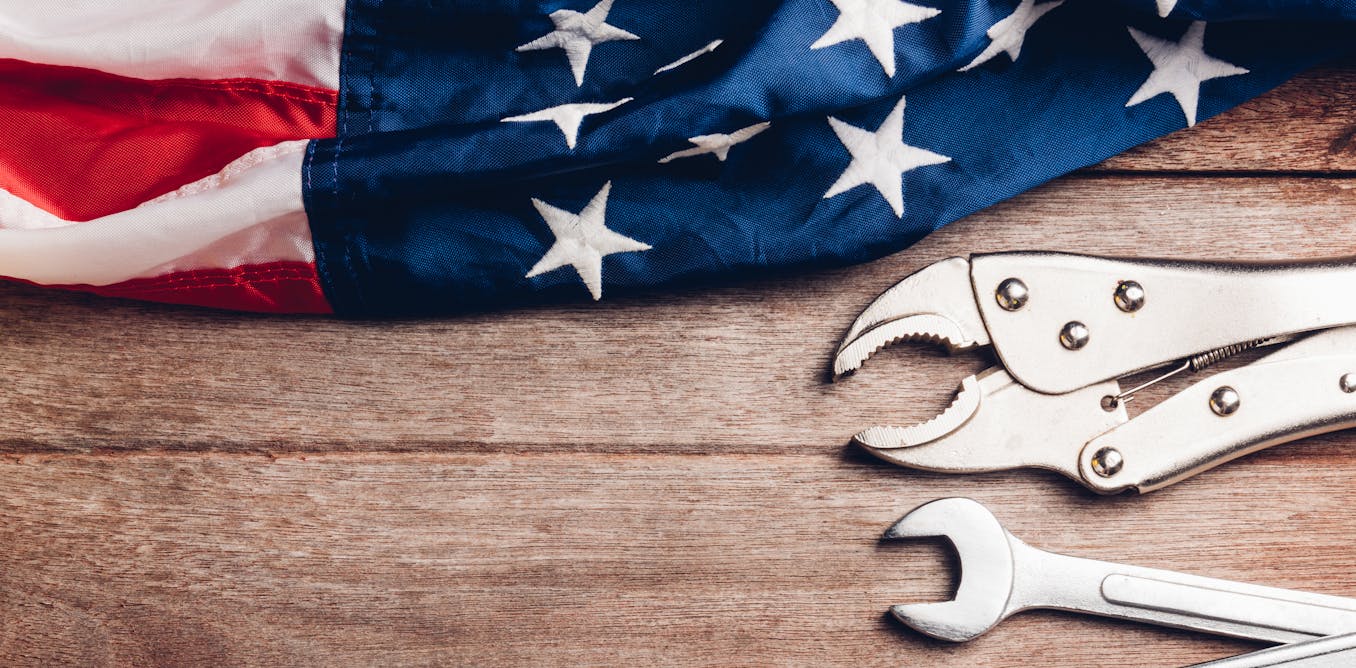In an interview in which Donald Trump said that he wants to be “a whale psychologist”, made the case for replacing income tax with tariffs and praised Confederate general Robert E Lee as a “genius”, the most striking thing about the former president’s encounter with podcaster Joe Rogan wasn’t the content as much as the length.
Over three hours, perhaps the longest ever campaign interview with a presidential candidate, Trump said very little that was factual but revealed a surprising amount about his disposition and his thinking should he return to office.
The Republican nominee’s appearance on Rogan makes smart political sense. Rogan, a commentator on Ultimate Fighting Championship broadcasts and comedian, began podcasting in 2009 and is now the most successful host in history. The Joe Rogan Experience is continually atop the global charts on both Apple and Spotify, earning almost half a billion dollars from deals with the latter.
For months now, the Democrats and their nominee, Kamala Harris, have been polling surprisingly poorly with young men compared with previous election cycles, creating consternation among party insiders. Rogan reaches the kind of politically skeptical young men with low trust in Washington DC – and in the news media that both parties believe could help them reach the White House.
That’s why at the start of the week, with polls tightening and Democrats concerned they may be “blowing” the election, the rumours were that it would be Harris who would appear on the podcast. It could have been one of the few media appearances that actually shifts the conversation and could have won over some undecideds. But her team eventually backed out of an appearance, perhaps concerned about the long freewheeling format. So it was announced that it would be Trump who would appear on the show.
Rogan’s initial questioning of Trump was inquisitive and unexpected. He asked about what it felt like entering the White House with no political experience. Trump responded honestly, saying it was more surreal than later being shot in the tip of one of his ears. He said that he “had made his money largely on luxury” and that he was amazed by how beautiful it was inside. He talked about the difficulties of transition for a non-politician who had “no experience and no idea who to appoint”. He sympathised with Mary Todd Lincoln’s “melancholia”. It seemed like Rogan’s inquisitive style might get something new from the former president.
But very quickly the interview descended into a long, rambling and often boring venture through Trump’s greatest hits. He demonised migrants, spoke warmly about Vladimir Putin and falsely claimed the 2020 election had been stolen from him. Rogan tried to push him on nuclear power and the environment. But Trump only wanted to discuss how ugly he finds windfarms – and how their vibrations upset the whales – and the ways in which environmental regulations would stop him getting permits for his buildings in New York.
In May, pollsters for the New York Times/Siena College analysed their data to see what were the key predictors for why a voter who supported Joe Biden when he defeated Trump in 2020 might defect to the Republican against Harris.
They found that the No 1 predictor was whether the voter was born in the Middle East, a reflection of the Democrats’ position on the war in Gaza. The No 2 predictor was whether they had a favorable view of Rogan. For some young male voters, he’s their main source of political information.
Rogan himself is a political riddle. He’s a conspiracy theorist and an anti-vaxxer and so is often painted as rightwing or Trump-supporting – but he’s actually got a complex and often conflicting set of beliefs. He fiercely defends abortion rights, gay marriage and gun rights. He’s gravitated toward outsider candidates like Bernie Sanders and RFK Jr – he voted for the Libertarian candidate Jo Jorgensen in the previous election. In 2022, Rogan described Trump as an “existential threat to democracy”.
Harris, who has been struggling to define herself with voters, may have found the relaxed atmosphere helpful – especially as Rogan tends to always agree with what his guests say.
He allowed to Trump brazenly lie – about election fraud, the deficit, his tax policy and many other issues – without ever challenging him. He also appeared to agree with him on many positions that he’s previously taken the opposite stance and painted election deniers as an oppressed group, saying: “You get labelled, it’s like being labelled an anti-vaxxer.”
after newsletter promotion
The pair discussed Rogan’s previous support for RFK Jr, who Trump promised could do “whatever” when it came to health policy in his administration, which placated the podcast host but may concern the mainstream scientific and medical community against whom Kennedy has railed.
Rogan had one good moment as an interviewer, asking Trump if he was ever going to “present” his supposed evidence of election tampering. But he let Trump ramble on to a different topic: Hunter Biden’s laptop.
Because of this easy ride, Trump came off sounding old, doddering and unintelligent – but politically unscathed. He was allowed to blame all of America’s ills on Democrats and paint himself as a great leader. He attacked Harris, calling her “low IQ” and that she “couldn’t put two sentences together”. She was one of a number of women whom Trump and Rogan dismissed as “stupid”, perhaps with a nod to the young misogynist voters who could be persuaded to vote for the former president.
For the most part, Rogan – not the smartest cookie himself – simply nodded along. He finished by saying having Trump on was “a lot of fun”.
For anyone else who made it through all three hours, that might have been the biggest lie of all.

 German (DE)
German (DE)  English (US)
English (US)  Spanish (ES)
Spanish (ES)  French (FR)
French (FR)  Hindi (IN)
Hindi (IN)  Italian (IT)
Italian (IT)  Russian (RU)
Russian (RU)  3 weeks ago
3 weeks ago
























Comments